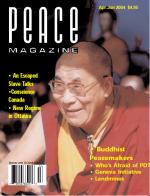
Peace Magazine Apr-Jun 2004, page 28. Some rights reserved.
Search for other articles by Murray Tbomson here
Dr. Elinor D.U. Powell. Northstone Publishing, 2003
"Spirituality is a practice of living"
- Daniel Scott.
"...and something vital and non-negotiable lying at the heart of our lives"
-- Ronald Rolheiser
All those who seek an end to war and a lessening of violent conflict in our world can gain much from Elinor Powell's new book, The Heart of Conflict: A Spirituality of Transformation. She brings to it a lifetime experience as a practicing physician in the field of internal medicine, a hospital Chief of Medical Staff, an activist leader with the International Physicians for the Prevention of Nuclear War and its Canadian branch, Physicians for Global Survival, and a staff member of the Institute of Conflict Analysis and Management in Victoria, B.C.
The book is divided into four major parts, preceded by a preface and introduction on the place of spirituality in conflict. This is perhaps the key to understanding the remainder of the book, for the concepts of spirit and spirituality are central, she claims, to the deeper resolution of conflict upon which civilization may depend.
"Our spirituality is...that essence of who we are as aware, sentient and intuitive human beings....It is most surely put to the test and thus more clearly manifested when we are faced with challenge and conflict....Spirituality is that fundamental property of our nature that affirms life and...inspires, animates and pervades our thoughts, feelings and actions. It's what inspires devotion to causes, from caring for the sick to saving the earth."
This concept, and those closely related to it such as soul, honor, and grace inform the remainder of the book and give focus and strength to her conclusions. Readers unable to fully accept such a conceptual approach nevertheless can gain much from the actual practice, methods, and results in conflict management and its resolution.
The author examines modernism and postmodernism, religion, and culture as major factors in the evolution of conflict management and its resolution. Her analysis of the evolutionary story of humankind is optimistic. She sides with those social scientists like Robert Axelrod and Anatol Rapoport who claim that human development has depended much more on cooperation than on conflict and competition. Human nature is not "nasty and brutish," as Hobbes would have it; we are instilled with spirit which is capable of infinite caring for, and sharing with others. Rediscovering this spirit can pass through stages, at first confusing and vulnerable, then through maturing depth and conviction. If one reaches the final stage the rewards are many, including a sense of inner peace; a tendency to adopt ethical standards in lifestyle and work; and a commitment to movements that address injustices.
The author also examines various approaches to conflict. Though systems of law are essential (because they define the limits of acceptable behavior and defend our right to live in security) they have flaws. They are adversarial, often cumbersome and costly, nor do they usually improve the relations between the opposing parties. The author suggests "we should resort to our legal codes only when coercive measures are necessary and all other avenues have been explored."
She emphasizes the importance of human dialogue, "the only real answer to the absolute power to destroy us all!" After summarizing strengths and weaknesses of forms of negotiation and mediation, such as positional bargaining and interest-based problem solving, she describes the transformation model developed by Robert Bush and Joseph Folger. Their goal is to "use the mediation process to transform the character of both the individuals and society as a whole." Though this method has much to offer, enabling as it does the parties to undergo human moral growth, the author believes that "it may also assume an impossible level of self-determination on the part of the participants, especially those with low social status."
Dr. Powell quotes Jay Rothman and Arnold Mindell, both proponents of this form of management: "Identity conflict is about who we really are and what we care about most deeply." "The very situations that are so impossible can also be your greatest teachers."
In Rothman's approach, he actually encourages parties to express their hostilities freely. From such revelations emerge "the bruised and battered spirits that are fighting so hard to survive." Then follows the sharing of stories, the development of resonance between them, followed by the invention of mutual solutions and consequent action.
Mindell sees intractable conflicts, such as those in Northern Ireland, as a crisis of the spirit, and gives examples from that conflict-torn area to show that those most resistant to change can turn out to be "our spiritual mentors."
Dr. Powell quotes Desmond Tutu's belief that forgiveness is in a person's own best interest, as it enables victims to emerge as whole beings. It releases them from anguish, and for the perpetrator it means freedom from guilt. "Yet the decision to forgive must always come from the one harmed, without pressure from others."
Many more examples of successes and failures in conflict transformation are contained in this book, enriched and enlivened by more than 60 quotes from the author's extensive research. The Heart of Conflict should be included in the reading lists of all who work for the resolution of conflict in this troubled world.

Peace Magazine Apr-Jun 2004, page 28. Some rights reserved.
Search for other articles by Murray Tbomson here